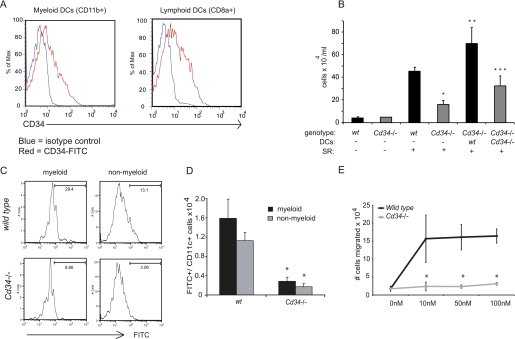Figure 6.
Adoptive transfer of wild-type (wt) dendritic cells (DCs) into Cd34−/− mice restores disease. (A) Representative example of CD34 expression in the two DC subtypes found in the splenic preparation (CD11b+ = myeloid; CD8+ = lymphoid). (B) Total inflammatory cells found in the bronchoalveolar lavage (BAL) of mice adoptively transferred with wt and Cd34−/− DCs. Data are presented as mean ± SEM and are representative of four separate experiments. n = 4–6 mice per group. *P < 0.05, Cd34−/− compared with wt. **P < 0.05, Cd34−/− + wt DCs compared with Cd34−/− alone. ***P < 0.05, Cd34−/− + wt DCs compared with Cd34−/− + Cd34−/− DCs. (C) Flow cytometry plots representing fluorescein isothiocyanate (FITC)+ myeloid (CD11b+) and nonmyeloid (CD11bneg)/CD11c+ lymph node cells. (D) Numbers of Cd11c+/FITC+ cells in the cervical lymph nodes isolated from wt and Cd34−/− mice. (E) Splenic DCs were derived from wt and Cd34−/− mice and examined for their ability to chemotax across matrigel-coated transwells in response to increasing concentrations of CCL19.

